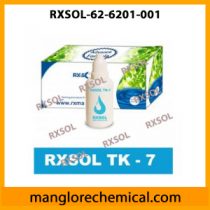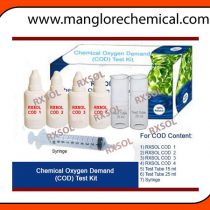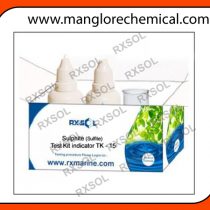The reagent keeps colour on good passivated stainless steel. A black spot will appear when the surface has not been passivated correctly. Various qualities of passivation will give graduations of grey shades, ranging from light (acceptable) to dark (unacceptable).
Also refer this link ::: Ferroxyl Test Kit for free IRON passivation ( http://rxmarine.com/Ferroxyl-Test-Kit-for-free-IRON )
Passivity Test Kit for PASSIVATION ( http://rxmarine.com/Passive-Film-Testing )
Application:
The RXSOL Passivation Test Kit is an easy and economical test kit to determine the Passiveness of austenitic stainless steel. Stainless steel is protected from corrosion by a thin layer that consists mainly of chromium oxide. Oxygen from the atmosphere is normally able to form and maintain this passive layer. Contamination, surface defects and imperfections disturb the formation and repair of the chromium oxide layer and reduce the resistance to severe or local corrosion. Therefore it is very important to test if your stainless steel is still passive to prevent corrosion and damage.
The measure of passivation of stainless steel can be determined with a palladium chloride reagent. The reagent keeps colour on good passivated stainless steel. A black spot will appear when the surface has not been passivated correctly. Various qualities of passivation will give graduations of grey shades, ranging from light (acceptable) to dark (unacceptable).
Palladium Test
There is no or slight colour change on well passivated stainless steel after 3 minutes wetting with palladium chloride reagent. If after rinsing a gray spot appears, the metal is partially passivated. A black spot will arise when the surface has not been passivated correctly. The palladium chloride reagent is corrosive for stainless steel, therefore it is very important to rinse carefully.
Dose:
Palladium chloride test for active surfaces:
Passive steel does not liberate Hydrogen form Sulphuric acid. Palladium can absorb 900 times its own volume of Hydrogen by Adsorbsion and Occlusion. Hydrogen gas reduces Palladium Chloride PdCl2 easily to form black Palladium metal and Hydrogen Chloride.
H2 + PdCl2 = Pd + 2 HCl
This is the reason that Sulphuric acid or HCl must be mixed with palladium chloride if the black precipitate of metal must be seen by the naked eye. Passive SS does not liberate hydrogen. Palladium Chloride results can be tested using a mass spectrometer too.
Rinse PdCl2 with DI water from a squirter as the black spot is active.
If free iron ( not oxidised iron ) is present on the SS surface the iron is oxidised by Palladium Chloride ( acid reagent solution ) to iron oxide.
4PdCl2 + 4 H2O + 3 Fe = 4 Pd + 8 HCl + Fe304
Palladium chloride comes in a small bottle with a dropper. The contact time should be 3 min minimum. The shelf life is one year if you keep it in the fridge in a coloured bottle.
we are also supplying it. Palladium chloride crystals or deliquiscent powder is soluble in water or alcohol.
Note:
The RXSOL Passivation Test Kit contains:
· Reagent TK
· Demineralized Water (0.5 ltr)
· Squeeze Bottle (500 ml)
· Latex Gloves (10 pcs)
· Non woven cleaning pads (5 pcs)
· Instruction Manual
dimensions: 16 x 18 x 20





Reviews
There are no reviews yet.